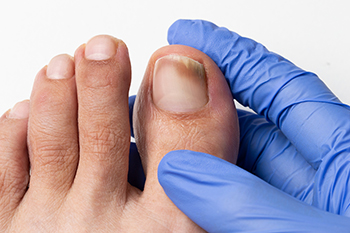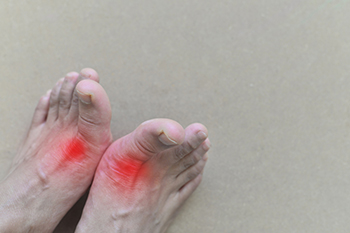

Onychomycosis, commonly known as toenail fungus, is a fungal infection that affects the toenails, leading to discoloration, thickening, and brittleness. This condition occurs when dermatophyte fungi invade the nail bed, typically thriving in warm, moist environments such as sweaty shoes or communal showers. Additionally, yeast and mold can also contribute to the development of onychomycosis. Several factors increase the risk of contracting this infection, including aging, poor circulation, and a weakened immune system. Other factors include trauma to the nail and pre-existing conditions like diabetes or athlete's foot. Furthermore, habits such as walking barefoot in public areas or sharing nail grooming tools can facilitate fungal transmission. Onychomycosis not only affects the aesthetic appearance of the nails but can also cause discomfort, pain, and difficulty in walking if left untreated. If you have developed toenail fungus, it is strongly suggested that you visit a podiatrist who can offer you treatment options which often include prescribed medication for complete healing.
For more information about treatment, contact Dr. Alan J. Spector of Shore Podiatry. Our doctor can provide the care you need to keep you pain-free and on your feet.
Toenail Fungus Treatment
Toenail fungus is a condition that affects many people and can be especially hard to get rid of. Fortunately, there are several methods to go about treating and avoiding it.
Antifungals & Deterrence
Oral antifungal medicine has been shown to be effective in many cases. It is important to consult with a podiatrist to determine the proper regiment for you, or potentially explore other options.
Applying foot powder on the feet and shoes helps keep the feet free of moisture and sweat.
Sandals or open toed shoes – Wearing these will allow air movement and help keep feet dry. They also expose your feet to light, which fungus cannot tolerate. Socks with moisture wicking material also help as well.
If you have any questions please feel free to contact our office located in Point Pleasant, NJ . We offer the newest diagnostic tools and technology to treat your foot and ankle needs.

Recovery from foot surgery can be a challenging process, but there are steps you can take to expedite healing and regain mobility sooner. This can begin by adhering strictly to the post-operative instructions provided by your podiatric team, including rest, elevation, and medication schedules. Proper nutrition is essential for supporting the body's healing processes, so focus on consuming a balanced diet rich in protein, vitamins, and minerals. Keep the surgical site clean and dry to prevent infections, and change dressings as instructed. Consider using assistive devices such as crutches or walkers to avoid putting weight on the foot during the initial stages of recovery. Stay connected with your podiatrist, attending follow-up appointments and addressing any concerns promptly. Finally, be patient and give your body the time to heal properly, avoiding activities that could delay recovery. If you have questions about recovery from your specific type of foot surgery, it is suggested that you consult with your podiatrist who can guide you on the best healing approach.
Foot surgery is sometimes necessary to treat a foot ailment. To learn more, contact Dr. Alan J. Spector of Shore Podiatry. Our doctor will assist you with all of your foot and ankle needs.
When Is Surgery Necessary?
Foot and ankle surgery is generally reserved for cases in which less invasive, conservative procedures have failed to alleviate the problem. Some of the cases in which surgery may be necessary include:
What Types of Surgery Are There?
The type of surgery you receive will depend on the nature of the problem you have. Some of the possible surgeries include:
Benefits of Surgery
Although surgery is usually a last resort, it can provide more complete pain relief compared to non-surgical methods and may allow you to finally resume full activity.
Surgical techniques have also become increasingly sophisticated. Techniques like endoscopic surgery allow for smaller incisions and faster recovery times.
If you have any questions please feel free to contact our office located in Point Pleasant, NJ . We offer the newest diagnostic and treatment technologies for all your foot and ankle needs.

Gout, often characterized by sudden and intense pain, swelling, and redness in the joints, primarily affects individuals who exhibit certain predisposing factors. Men over the age of 40 are particularly susceptible, as are postmenopausal women due to hormonal changes. Additionally, those with a family history of gout are at an increased risk, suggesting a genetic component to the condition. Lifestyle choices can also play a significant role. Excessive alcohol consumption, particularly beer, and a diet rich in purine-containing foods such as red meat, seafood, and organ meats can elevate the risk. Additionally, obesity and conditions like high blood pressure, diabetes, and kidney disease are associated with a higher likelihood of developing gout. Taking certain medications, such as diuretics, can contribute to elevated uric acid levels, increasing the likelihood of gout flare-ups. If you have had one or more gout attacks, it is strongly suggested that you are under the care of a podiatrist who can help you to manage this condition.
Gout is a foot condition that requires certain treatment and care. If you are seeking treatment, contact Dr. Alan J. Spector from Shore Podiatry. Our doctor will treat your foot and ankle needs.
What Is Gout?
Gout is a type of arthritis caused by a buildup of uric acid in the bloodstream. It often develops in the foot, especially the big toe area, although it can manifest in other parts of the body as well. Gout can make walking and standing very painful and is especially common in diabetics and the obese.
People typically get gout because of a poor diet. Genetic predisposition is also a factor. The children of parents who have had gout frequently have a chance of developing it themselves.
Gout can easily be identified by redness and inflammation of the big toe and the surrounding areas of the foot. Other symptoms include extreme fatigue, joint pain, and running high fevers. Sometimes corticosteroid drugs can be prescribed to treat gout, but the best way to combat this disease is to get more exercise and eat a better diet.
If you have any questions please feel free to contact our office located in Point Pleasant, NJ . We offer the newest diagnostic and treatment technologies for all your foot and ankle needs.